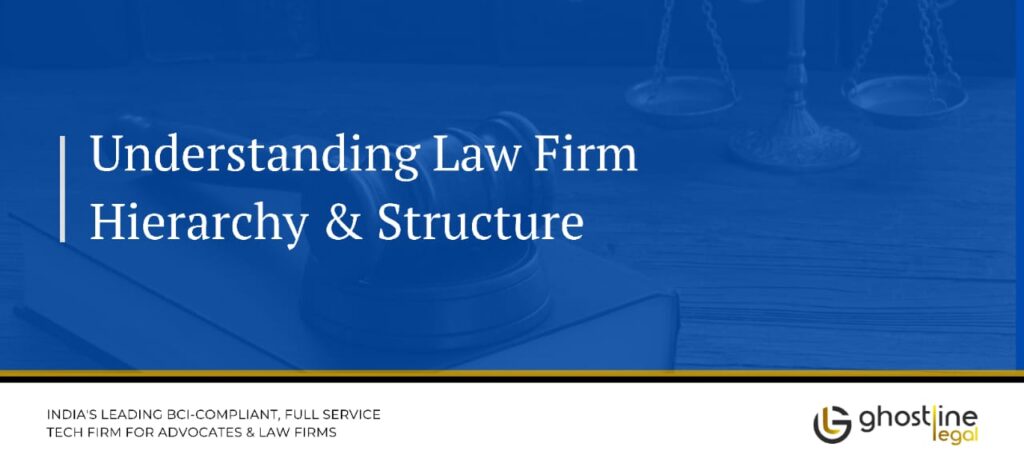Law firms function within an intricate web of duties and responsibilities, with each title in the hierarchy playing an important role in providing quality legal services. These law companies are more than just a group of lawyers; they are complex organizations with clearly structured hierarchies. This structure guarantees that each member understands their specific position and duties within the overall framework. The firm’s hierarchy fosters cohesion and efficiency by clearly defining lines of authority and abilities. This, in turn, enables the firm’s broad knowledge to effectively answer client’s different needs while also navigating the complexities of the legal landscape with accuracy and expertise.
The Hierarchy Structure of Law Firms
Law firms are structured so that each member’s responsibilities are clear. Most of the time, the following categories make up the hierarchy of legal firms-
- Law Firm Partners
A managing partner is typically in charge of setting firm goals and developing strategic techniques to achieve them. They manage the firm’s finances, which include salaries and overhead costs. The partners are at the top of the hierarchy, playing critical roles in the management and operation of law firms. Partners, who have substantial legal experience, play critical roles in firm operations and finances and are often the founding members of the firm itself. Partners may own equal or partial stakes in the company, determining their level of influence over its operations.
These partners are responsible for –
- Developing new business while maintaining relationships with clients.
- Delegating work to other legal specialists in the firm.
- Participating in and voting on key company decisions.
- Using diverse management strategies to handle long-term strategy as well as day-to-day operations.
Equity and non-equity partners make up partnerships in law firms. Equity partners, who are senior lawyers at the firm, own shares and share profits. They foster business growth through their client portfolios while adhering to billable hour constraints. Their voting rights give them sway over hiring, expansion, and investment decisions. Non-equity partners perform identical obligations with less voting rights. After donating capital to the firm, they may migrate to an equity partnership. For experienced lawyers looking for more flexibility, a non-equity partnership provides an alternative to taking part in equity.
- Associates
Associates are bright, young legal professionals who have recently joined the firm and have great potential to become partners in the firm someday. To enhance their legal skills, associates typically collaborate extensively with law firm partners and senior associates. Legal associates are typically capable of handling a wide range of legal activities. A legal associate’s responsibilities vary based on the firm’s size and area of specialization.
Following are some of the usual roles of legal associates:
- Preparing legal documents for lawyers.
- Obtaining all necessary case information from the client
- Giving legal advice to clients
- Working with other members of the firm or persons from outside the firm to analyze each matter.
- Senior Associates
A senior legal associate is a higher-level associate lawyer with five or more years of experience. Senior associates, sometimes known as managing associates, frequently take on greater leadership responsibilities in addition to their legal obligations as fully trained and practicing lawyers. Senior associates at law firms perform a variety of tasks, allowing them to become an integral part of the firm. Senior associates are lawyers who have not yet become partners at the firm but are on their way. Senior associates in the law firm hierarchy are accountable for the following –
- Supervising a team of junior associates, paralegals, and other legal professionals.
- Assisting and delegating tasks to teammates and juniors.
- Evaluating and editing important legal documents.
- Taking on a client’s case and representing them in court.
- Junior Associates
Junior associates are college students or recent law graduates who are just starting out in their legal careers. These associates report to senior associates, lawyers, and partners. Obtain knowledge and expertise in the legal field. They frequently participate in legal activities connected to assisting lawyers with their casework. Most companies train junior associates for at least two years before deciding to recruit them full time. When junior associates first join a legal firm, they are typically in the midst of intense learning.
These are some of the responsibilities of junior associates:
- Conducting legal research for lawyers.
- Drafting and proofreading legal documents.
- Preparing and documenting minutes for shareholders.
- Participating in discussions of non-disclosure agreements.
- Carrying out due diligence responsibilities, such as creating legal documentation for lawyers.
- Paralegals & Legal Support Staff
Among the layers of lawyers in a law firm’s hierarchy are the necessary paralegals and legal support workers. These experts serve a dual role, performing both administrative work and legal responsibilities that are critical to the firm’s operations. Paralegals, in particular, are key pillars of support for attorneys, covering a wide range of activities from document preparation to scheduling, allowing lawyers to operate more efficiently. Paralegals use their qualifications to expertly assist lawyers with many elements of casework, ensuring seamless progress and organization. Meanwhile, legal support staff, also known as ‘non-fee earners’, perform a variety of functions critical to the firm’s operations.
These professionals are the backbone of the firm’s administrative duties, handling everything from case files to client correspondence and confidential information. Their contributions include IT, human resources, finance, secretarial support, and business development, all of which help the firm deliver full legal services more effectively.
Understanding How It Works
Law firm partners intentionally organize their professions into distinct “practice areas,” which represent different areas of legal knowledge, such as family law or employment law etc. Within these fields, lawyers, trainees, and paralegals work together to efficiently meet the legal needs of their clients. Clients give their legal concerns to these teams, which collaborate to provide high-quality services within agreed-upon periods. After completing the service, the firm bills the client depending on the hours worked.
According to an American Bar Association research, it takes 7-10 years on average for an associate to be promoted to partner. However, this timescale may change depending on the individual’s performance, the firm’s demands, and market conditions which poses a question on the career development in this field.
The levels inside a law firm are an intriguing representation of the legal industry’s organization and career advancement. Understanding the hierarchy inside a law firm can be beneficial to your own career advancement, whether you are an aspiring attorney, paralegal, or legal assistant. Accepting opportunities and challenges at all levels is critical for success in the dynamic and ever-changing world of law.
The law firm hierarchy does have few issues which include retention of employees, succession planning, technology integration, billing adjustments, and dealing with disruptive competition. In this setting, cultivating diversity and inclusion is the key. Balancing tradition and innovation is vital for success.
To this end, a law firm’s hierarchy is a finely tuned system in which partners lead by vision, associates strive for excellence, and support staff assure smooth operations. Nonetheless, in the face of obstacles like personnel retention and technological innovation, the firm’s ability to adapt and innovate is critical.In our ever-changing world, combining tradition with innovation pushes us forward, assuring a future where justice and excellence prevail.
Ghostline Legal is India’s leading, BCI-compliant, full-service tech and content firm catering exclusively to advocates and litigation chambers.








